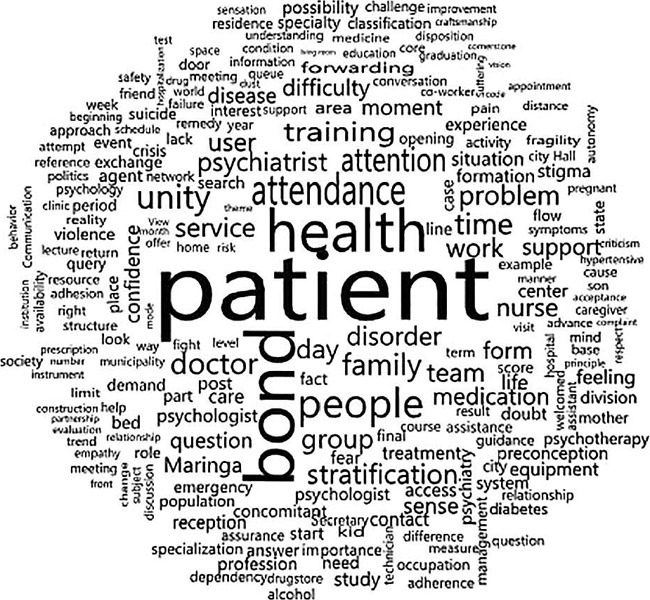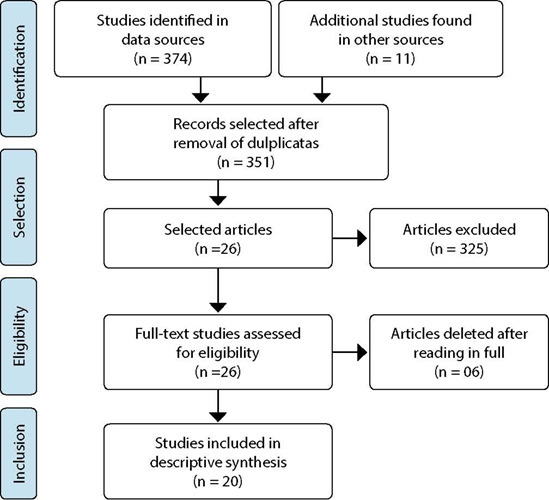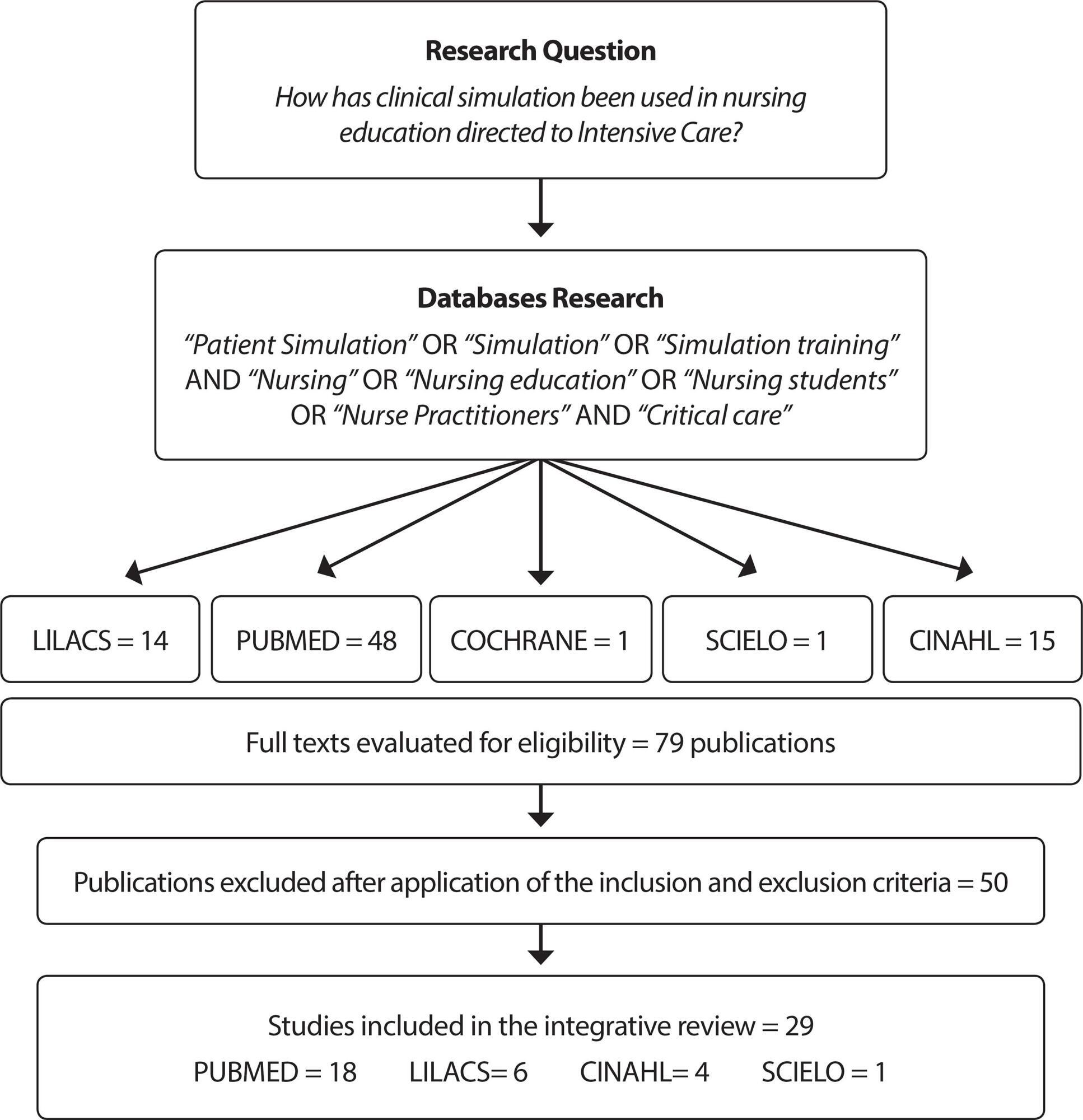-
ORIGINAL ARTICLE11-26-2022
Transitional care of nurses to older adults with artificial pacemaker
Revista Brasileira de Enfermagem. 2022;75:e20210192
Abstract
ORIGINAL ARTICLETransitional care of nurses to older adults with artificial pacemaker
Revista Brasileira de Enfermagem. 2022;75:e20210192
DOI 10.1590/0034-7167-2021-0192
Views0See moreABSTRACT
Objective:
to understand how the transitional care of nurses to olde adults with artificial pacemaker occurs.
Method:
a qualitative research, carried out in a philanthropic hospital in the city of Salvador, Bahia, Brazil. Fourteen nurses working in surgical and cardiac inpatient units participated. Data were collected between August and November 2020, through semi-structured interviews, and analyzed using the methodological framework Discourse of the Collective Subject and discussed in the light of Afaf Meleis’ theory of transitions.
Results:
nurses’ incipient knowledge about transitional care was identified. It was observed that the nursing discharge report is a facilitating instrument for transitional care.
Final considerations:
the study pointed out that the transitional care of nurses to older adults with artificial pacemakers does not have a theoretical foundation, reporting as a priority the care with the pacemaker identification card and with the surgical wound.
-
ORIGINAL ARTICLE11-26-2022
Mental health assistance in Primary Care: the perspective of professionals from the Family Health Strategy
Revista Brasileira de Enfermagem. 2022;75:e20190326
Abstract
ORIGINAL ARTICLEMental health assistance in Primary Care: the perspective of professionals from the Family Health Strategy
Revista Brasileira de Enfermagem. 2022;75:e20190326
DOI 10.1590/0034-7167-2019-0326
Views0See moreABSTRACT
Objective:
To learn about the perceptions of the professionals who work in Primary Health Care about mental health care.
Methods:
Descriptive and qualitative study, carried out with 29 health workers through open and individual interviews. The IRaMuTeQ® software was used to organize the data which, then, was submitted to a content analysis process in the thematic modality.
Results:
Three classes emerged from the content analysis: “Perceptions about the mental health care provided in the city”, “The biomedical paradigm in mental healthcare”, and “Elements for the construction of a new way for professionals to act in mental health”.
Final considerations:
It was found that, despite the good infrastructure of the services and the elements pointed at by the professionals to create a new way to act, they do not do so, and the responsibility falls, mostly, on the psychologist to carry out these activities.

-
REVIEW11-26-2022
Parental burnout: a scoping review
Revista Brasileira de Enfermagem. 2022;75:e20210203
Abstract
REVIEWParental burnout: a scoping review
Revista Brasileira de Enfermagem. 2022;75:e20210203
DOI 10.1590/0034-7167-2021-0203
Views0See moreABSTRACT
Objective:
to map available evidence on parental burnout theme.
Method:
scoping review as according to the Joanna Briggs Institute. Search in January 2021, in six databases of publications in English, Portuguese or Spanish, without time limits. Data extracted and descriptively analyzed by three independent researchers.
Results:
374 articles were identified and 20 were included in the final sample, all published in English, from 2017 onwards. Parental burnout is a complex, multifactorial problem, distinct from burnout cases, depressive symptoms and other mental health alterations. It affects 0.2 to 20% of parents, has validated and suitable instruments for measurement; if not treated, can have consequences on marital life, work relationships, child neglect and violence.
Conclusions:
this is a recent theme that needs to be explored, due to the possible impact on children’s and families’ health and on parents’ work processes. Protocol registered in the Open Science Framework ().

-
ORIGINAL ARTICLE11-26-2022
Religiosity and spirituality in mental health: nurses’ training, knowledge and practices
Revista Brasileira de Enfermagem. 2022;75:e20200345
Abstract
ORIGINAL ARTICLEReligiosity and spirituality in mental health: nurses’ training, knowledge and practices
Revista Brasileira de Enfermagem. 2022;75:e20200345
DOI 10.1590/0034-7167-2020-0345
Views0See moreABSTRACT
Objective:
to analyze nurses’ training, knowledge and practices in the religiosity/spirituality interface in the context of Psychosocial Care Centers.
Methods:
a descriptive, exploratory, qualitative study, carried out in a metropolitan region of Ceará. Four nurses were interviewed, and the data were examined using the content analysis technique.
Results:
four categories emerged from analysis: Deficit in teaching religious and spiritual practices in higher education in nursing; View of the concept of religiosity and spirituality; Religiousness and spirituality as an integral part of the person; Reception of religious and spiritual practices as an aid to treatment.
Final considerations:
a deficit in nursing undergraduate teaching was identified concerning religiosity and spirituality. However, the interviewed professionals understand the importance of religious and spiritual dimensions in the therapeutic process, even though they do not accurately differentiate the concepts.
-
ORIGINAL ARTICLE11-26-2022
Health beliefs and adherence of the elderly to fall prevention measures: a quasi-experimental study
Revista Brasileira de Enfermagem. 2022;75:e20201190
Abstract
ORIGINAL ARTICLEHealth beliefs and adherence of the elderly to fall prevention measures: a quasi-experimental study
Revista Brasileira de Enfermagem. 2022;75:e20201190
DOI 10.1590/0034-7167-2020-1190
Views0See moreABSTRACT
Objective:
To evaluate the effect of an educational intervention on health beliefs and adherence of elderly people to fall prevention measures.
Methods:
This is a quasi-experimental study, carried out at the Senior Citizens’ Center. Sixty-eight elderly completed the intervention. The intervention consisted of four meetings focused on beliefs about falls and prevention, and the evaluation occurred at baseline and 30 days after completion.
Results:
The elderly were predominantly women (83.82%), with one to four years of schooling (36.76%), with health problems (95.59%), and 48.53% had fallen. There was a significant increase in perceived susceptibility, severity, benefits, barriers, and total health belief score post educational intervention. By adding total to partial adherence, there was a significant increase in the adherence of the elderly to fall prevention measures after the educational intervention.
Conclusion:
Educational intervention was able to improve the beliefs and adherence of the elderly to fall prevention measures.
-
ORIGINAL ARTICLE11-26-2022
Vulnerability and quality of life of older persons in the community in different situations of family care
Revista Brasileira de Enfermagem. 2022;75:e20210034
Abstract
ORIGINAL ARTICLEVulnerability and quality of life of older persons in the community in different situations of family care
Revista Brasileira de Enfermagem. 2022;75:e20210034
DOI 10.1590/0034-7167-2021-0034
Views0See moreABSTRACT
Objective:
to correlate socio-contextual aspects, physical vulnerability and quality of life of older persons in the community in different situations of family care.
Methods:
epidemiological, a cross-sectional and analytical study, with elderly people in the community (n=769), with application of the instruments: Vulnerable Elders Survey-13 (VES-13), World Health Organization Quality of Life for Older Persons (WHOQOL-OLD) and the World Health Organization Quality of Life (WHOQOL-BREF); and socio-contextual data questionnaire.
Results:
the population assessed presented an average of regular quality of life in both the WHOQOL-BREF and the WHOQOL-OLD. Older non-vulnerable persons (62.2%) and those with close family contact (82.6%) have a better quality of life than the vulnerable (p<0.0001).
Conclusion:
lower quality of life scores and more distant families are related to vulnerable elderly people; thus, the assessment of family proximity and physical vulnerability of older persons is shown to be an important factor in improving quality of life.
-
11-25-2022
Populações vulnerabilizadas no contexto da pandemia e crises sanitárias
Revista Brasileira de Enfermagem. 2022;75:e75Suppl201
Abstract
Populações vulnerabilizadas no contexto da pandemia e crises sanitárias
Revista Brasileira de Enfermagem. 2022;75:e75Suppl201
DOI 10.1590/0034-7167.202275Suppl201pt
Views0As condições e os modos de vida da população determinam o processo de saúde e adoecimento de forma diferenciada entre os diversos grupos populacionais. As desigualdades na saúde vêm adquirindo relevância ainda maior na produção de diferentes perfis de doença, em função de recentes e surpreendentes acontecimentos mundiais, como divergências étnico-raciais, religiosas, territoriais, identidade de […]See more -
11-25-2022
Reflections on science in gerontological nursing: possibilities for its path
Revista Brasileira de Enfermagem. 2022;75:e75Suppl401
Abstract
Reflections on science in gerontological nursing: possibilities for its path
Revista Brasileira de Enfermagem. 2022;75:e75Suppl401
DOI 10.1590/0034-7167.202275Suppl401
Views0Scientific knowledge in Brazilian gerontological nursing has its beginnings more than 50 years ago, specifically in the mid-1970s, in line with the worldwide movement to recognize the complexity of population aging and its challenges in the social, cultural, political and public health spheres. Since then, scientific production in this field has been related to the […]See more
-
ORIGINAL ARTICLE06-08-2020
Usability of a mobile application on diabetic foot self-care
Revista Brasileira de Enfermagem. 2020;73(4):e20180862
Abstract
ORIGINAL ARTICLEUsability of a mobile application on diabetic foot self-care
Revista Brasileira de Enfermagem. 2020;73(4):e20180862
DOI 10.1590/0034-7167-2018-0862
Views0See moreABSTRACT
Objectives:
to assess the usability of an app prototype for diabetic foot self-care by an end user.
Methods:
a descriptive study that uses heuristic assessment of a hybrid app usability. Fifteen users of an outpatient diabetes care service in a capital of Northeastern Brazil participated in the study during April 2018. The usability measurement tool called Smartphone Usability questionnaiRE was applied.
Results:
the lowest score was 77 and the highest was 112, with an average usability of 96.1 points. Usability was framed in the last two levels, 70 and 8o. Users now strongly agree (level 70) and fully (level 80) with the assessed items, which represents good usability of the apps prototype.
Conclusions:
the final product developed focuses on user needs and requirements, which can ensure usability based on effectiveness, efficiency and satisfaction triad.
-
08-19-2019
Clinical simulation in nursing education in intensive therapy: an integrative review
Revista Brasileira de Enfermagem. 2019;72(4):1061-1070
Abstract
Clinical simulation in nursing education in intensive therapy: an integrative review
Revista Brasileira de Enfermagem. 2019;72(4):1061-1070
DOI 10.1590/0034-7167-2018-0217
Views0See moreABSTRACT
Objective:
to analyze the publications on clinical simulation practices for education in Nursing in Intensive Care.
Method:
an integrative review carried out through LILACS, PubMed, Cochrane Library, CINAHL and SciELO databases, of articles published from 2008 to 2017.
Results:
29 articles were selected, of which 76% discuss the use of simulation in continuing education of nursing professionals, while the others describe their use for student education. There is a higher prevalence of studies with a level of evidence 6 (17), with 28 international publications. There was an increase in scientific production, with 16 articles published in the last three years.
Conclusion:
variables after simulation use, such as confidence, communication skills, efficiency in the identification of clinical worsening of patients, development of technical skills, teamwork and clinical decision-making, presented a significant improvement, demonstrating that this tool is effective in qualifying care for critical patients.

-
ORIGINAL ARTICLE09-16-2019
Social incentives for adherence to tuberculosis treatment
Revista Brasileira de Enfermagem. 2019;72(5):1182-1188
Abstract
ORIGINAL ARTICLESocial incentives for adherence to tuberculosis treatment
Revista Brasileira de Enfermagem. 2019;72(5):1182-1188
DOI 10.1590/0034-7167-2017-0654
Views0See moreABSTRACT
Objective:
To analyze the influence of social incentives for adherence to tuberculosis (TB) treatment.
Method:
Qualitative study, in which 26 primary health care professionals of São Paulo were interviewed in 2015.Their testimonies were submitted to the speech analysis technique. The theoretical reference was the social determination of the health-disease process. Ethical procedures were observed.
Results:
TB is related to precarious living conditions. Incentives such as the basic food basket and transportation stipends are relevant for patients’ adherence to treatment, as well as to the create bonds between the patient and the health team.
Final considerations:
The incentives strengthened adherence to TB treatment. However, interventions in the context of public measures must transcend the remedial dimension and be guided towards the transformation of the TB situation, which means supporting processes that modify living conditions.
-
REFLECTION05-03-2021
Florence Nightingale’s theory and her contributions to holistic critical thinking in nursing
Revista Brasileira de Enfermagem. 2021;74(2):e20200139
Abstract
REFLECTIONFlorence Nightingale’s theory and her contributions to holistic critical thinking in nursing
Revista Brasileira de Enfermagem. 2021;74(2):e20200139
DOI 10.1590/0034-7167-2020-0139
Views0See moreABSTRACT
Objective:
to reflect on Florence Nightingale’s legacy and describe her contributions to critical holistic thinking in nursing.
Methods:
this is a theoretical reflection, for which scientific productions on Florence Nightingale’s environmental theory, as published in national and international journals, were based.
Results:
Florence Nightingale’s philosophy and teachings emphasize that the nurse must use her brain, heart and hands to create healing environments to care for the patient’s body, mind and spirit. Nursing, since the time of Nightingale, has been building the holistic paradigm, in all schools of thought, with a view to a humanistic approach to the human being in their indivisible relationship with the environment.
Final considerations:
Florence’s contributions to holistic critical thinking in nursing are evident, constituting nurses’ differential in clinical practice.
-
ORIGINAL ARTICLE07-01-2020
Homeless population: characterization and contextualization by census research
Revista Brasileira de Enfermagem. 2020;73(5):e20190236
Abstract
ORIGINAL ARTICLEHomeless population: characterization and contextualization by census research
Revista Brasileira de Enfermagem. 2020;73(5):e20190236
DOI 10.1590/0034-7167-2019-0236
Views0See moreABSTRACT
Objectives:
to analyze characteristics of homeless people and factors associated with living on the streets.
Methods:
a census-type sectional survey carried out between 2015 and 2018, in the municipality of Maringá-Paraná. A total of 701 homeless answered a structured questionnaire with sociodemographic data, living conditions, and drug use. We used Pearson’s correlation test for the association analysis of the variables at a 95% confidence level.
Results:
men (90.7%) the average age of 37.7 years had been homeless for an average of 5.39 years. Most had little education (54.2%), and homelessness was due to drug use (47.2%) and family disagreements (38.9%).
Conclusions:
drug use and family disagreements were the main reasons for homelessness. Time on the street, gender, and drugs were associated with a negative correlation to be homeless; and age, mean daily income, the number of daily meals, having been in prison, and having an income source were associated with positive correlation.
-
ORIGINAL ARTICLE10-21-2019
Religious/spiritual coping and spiritual distress in people with cancer
Revista Brasileira de Enfermagem. 2019;72(6):1534-1540
Abstract
ORIGINAL ARTICLEReligious/spiritual coping and spiritual distress in people with cancer
Revista Brasileira de Enfermagem. 2019;72(6):1534-1540
DOI 10.1590/0034-7167-2018-0585
Views0See moreABSTRACT
Objective:
To investigate the relation between the presence of spiritual distress and use of RSC and sociodemographic, clinical and religious/spiritual variables in people with cancer.
Method:
Cross-sectional study conducted in an association for support to people with cancer. The data obtained with the tools were analyzed using the Spearman‘s correlation coefficient and the Mann-Whitney Test.
Results:
129 volunteers participated in the study, of which 57% showed moderate spiritual distress, 96% used medium and high positive religious/spiritual coping. Spiritual distress showed positive correlation with negative religious/spiritual coping (P<0.001) and inverse correlation with age (p 0.002). The use of positive religious coping was statistically significant in people who have religious practices (p 0.001).
Conclusão:
Spiritual distress is a phenomenon that is present in the lives of people with cancer and has significant relation with the use, in a negative manner, of religion/spirituality as a way of coping with the disease.
-
REVIEW06-26-2023
Barriers to Pre-Exposure Prophylaxis (PrEP) use for HIV: an integrative review
Revista Brasileira de Enfermagem. 2023;76(3):e20210963
Abstract
REVIEWBarriers to Pre-Exposure Prophylaxis (PrEP) use for HIV: an integrative review
Revista Brasileira de Enfermagem. 2023;76(3):e20210963
DOI 10.1590/0034-7167-2021-0963
Views0See moreABSTRACT
Objectives:
to identify and synthesize scientific evidence on the barriers and difficulties for Pre-exposure Prophylaxis (PrEP) use and compliance for HIV.
Methods:
an integrative literature review, using the MEDLINE/PubMed, Cumulative Index to Nursing and Allied Health Literature (CINAHL), Academic Search Premier and Scopus (Elsevier) databases.
Results:
all (100%) the articles included identified that PrEP users experience some type of structural barrier related to health services such as long distance from the units, suboptimal logistics for taking pills and professional resistance to prescribing PrEP. Furthermore, 63.21% identified social barriers, such as stigma about sexuality and HIV, in addition to individual barriers such as alcohol use, adverse effects, and concerns about long-term toxicity.
Conclusions:
the barriers to PrEP use are multifactorial. Effective interventions are needed to support PrEP users in accessing, complying with, and retaining health services.

-
EXPERIENCE REPORT10-26-2020
Brazilian Nursing Process Research Network contributions for assistance in the COVID-19 pandemic
Revista Brasileira de Enfermagem. 2020;73:e20200798
Abstract
EXPERIENCE REPORTBrazilian Nursing Process Research Network contributions for assistance in the COVID-19 pandemic
Revista Brasileira de Enfermagem. 2020;73:e20200798
DOI 10.1590/0034-7167-2020-0798
Views0See moreABSTRACT
Objective:
to describe the theoretical construction process of nursing process support documents in COVID-19 care scenarios.
Methods:
an experience report of the joint activity of the Brazilian Nursing Process Research Network (Rede de Pesquisa em Processo de Enfermagem) composed of Higher Education and Health Institution researchers in Brazil.
Results:
five instruments were organized collectively, involving the elements of nursing practice (nursing diagnoses, outcomes and interventions) in assistance for community; for patients (with suspected or mild, moderate, and critical COVID-19 and residents in Nursing Homes); for nursing workers’ health support, also subsidizing registration and documentation during the COVID-19 pandemic.
Final considerations:
valuing the phenomena manifested by families/communities, patients and health professionals is essential for early detection, intervention, and prevention of diseases.
Search
Search in:
Nuvem de Tags
Adolescente (85) Atenção Primária à Saúde (239) COVID-19 (91) Criança (91) Cuidados de Enfermagem (269) Educação em Enfermagem (151) Educação em Saúde (139) Enfermagem (930) Enfermagem Pediátrica (86) Estudantes de Enfermagem (77) Estudos de Validação (131) Família (87) Idoso (208) Promoção da Saúde (99) Qualidade de Vida (104) Saúde do Trabalhador (86) Saúde Mental (145) Saúde Pública (82) Segurança do Paciente (150) Tecnologia Educacional (100)



